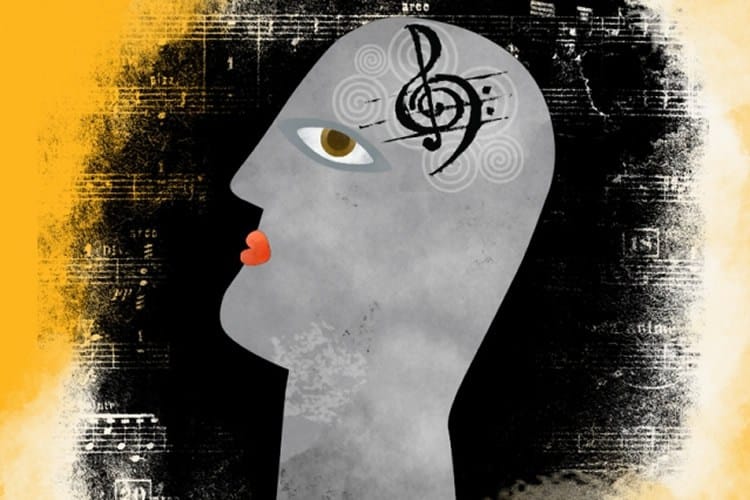Music and the brain

International research is of three kinds: scientific, science-fictionish and vacuous. Possibly belonging to the second category is recent work at MIT which used AI (artificial intelligence) to turn the Coronavirus into classical music. This is done, according to Professor Markus J. Buehler, to better understand the virus. Researchers assigned each amino acid – the building block of the spiked protein of the virus – a unique musical note. An algorithm then converted the notes to music. The first part of the resulting musical composition is soothing as the spiked protein eases into our unsuspecting cells. As the virus replicates and the protein binds to more cells, the music, we are told, turns dramatic and tumultuous, so we go from tinkling harmonics to a clashing and stormy finale.
Buehler hopes this will help develop antibodies by taking a musical counterpoint to the virus’s melody and rhythm, and use AI to find an antibody that matches it. The composition is one hour and 50 minutes long, so a nice concert length, but it is unlikely to feature in a Symphony Orchestra of India programme anytime soon.
Does anyone remember the Mozart Effect? The findings of a study in the 1990s suggested that listening to everyone’s favourite composer improved IQ. Don Campbell’s book on the subject became a best-seller. Called The Mozart Effect: Tapping the Power of Music to Heal the Body, Strengthen the Mind and Unlock the Creative Spirit, it had the advantage of a title so comprehensive, that it made reading of the book unnecessary. Campbell found this a lucrative bandwagon to board, and wrote a second book, The Mozart Effect for Children, then brought out related merchandise like special collections of music for babies and toddlers. The Governor of the American state of Georgia was so taken up by the idea that in January 1998, he announced an annual grant of $100,000 to provide every child born in the state with tapes or CDs of classical music. To get the legislation passed, Governor Miller played Beethoven’s ‘Ode to Joy’ to legislators and said, “Now don’t you feel smarter already?”
Sadly, more rigorous research showed that these findings were mythical: Mozart is magic but his music does not make you a genius. What it does is increase spatial intelligence by acting on an area of the brain that deals with visualisation of objects and spaces with the mind’s eye. Mozart’s Sonata for Two Pianos in D Major (K448) and his Piano Concerto No 23 (K488) seem to work best. This showed that Mozart was greater than Beethoven, someone proclaimed, till it was found that the Greek composer Yanni’s song ‘Standing in Motion’ worked well too.
Does all this really matter? Music, any music, has a positive, uplifting emotional quality. This is biologically due to the possibility that listening to music increases the body’s production of the antibody Immunoglobulin A, and also reduces the stress hormone cortisol, which is why music therapy is now taken seriously in medicine. Thirty trials carried on over 2000 cancer patients showed that music decreased anxiety and even stabilised heart rates and blood pressure levels. It worked particularly well with patients with dementia and clinical depression. Many hospitals also use music to ease anxiety levels during surgery and to relieve postoperative pain. As a clincher, Harvard neurologist Gottfried Schlaug found that the brains of adult musicians had more grey matter than those of non-musicians.
https://www.youtube.com/watch?v=-s68kHOnpiE
On behalf of non-musicians who love music, I would like to make the point that serious listening too results in an intense activation of both the left and right hemispheres of the brain. I also know from personal experience that music helps memory: ask me to give you the lyrics of pop songs of my teenage years and I will be lost; ask me to sing them, and I will remember every word from 50 years ago. It is a pity there are limits to these things otherwise a chemistry student could rattle off the periodic table set to rap.
All these theories have resulted in music being put to some unusual uses. A cattle-breeder in Turkey first found that playing classical music increased the milk yield of his cows. His reasoning was simple: if music relaxes humans why not cows? This was later backed by a 2001 study at the University of Leicester: they called it their Moosic Study. An Italian vet carries this further by singing arias to his ‘patients’.
The weirdest example comes from Germany where loud classical music is played in a sewage treatment plant: it helps break down waste faster, they found. According to the chief operator of the plant, ‘the secret is in the vibrations of the music which penetrate everything — including the water, the sewage and the cells.’ The possible connection between sewage and listeners of classical music is one I would rather not make.
What I would do instead is listen to 448, 488 and, of course, ‘Ode to Joy’, and listen with concentrated attention. If that does good things to my brain, that is a nice side effect. Incidentally, Mozart’s IQ has now been evaluated to be 165, genius level. So if nothing else, his own brain benefited from his music.
By Anil Dharker. This piece was originally published by the National Centre for the Performing Arts, Mumbai, in the November 2020 issue of ON Stage – their monthly arts magazine.






